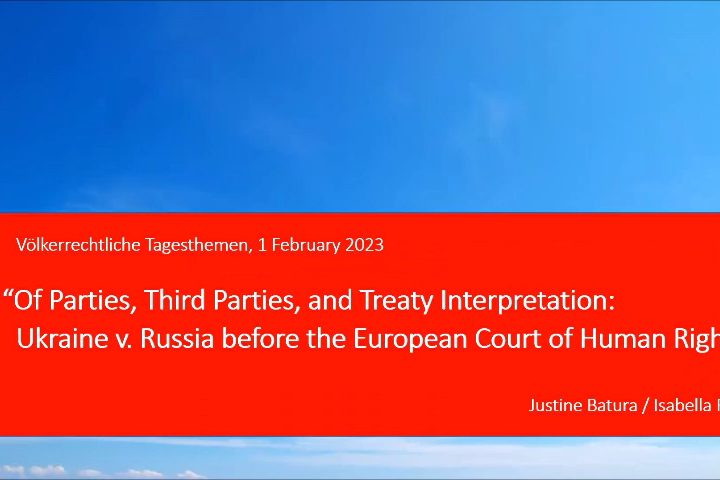Of Parties, Third Parties, and Treaty Interpretation: Ukraine v. Russia before the European Court of Human Rights
Völkerrechtliche Tagesthemen: Spotlight (Episode 34)
An unprecedented number of member States have requested permission to intervene in the case Ukraine v. Russia (X) before the European Court of Human Rights. The significance that can be ascribed to these interventions goes beyond a mere expression of solidarity with Ukraine. Not only are these third-party interventions a timely and much needed opportunity for States to express their support for the European regional human rights system and convey legitimacy to the later judgment. The procedural instrument under Art. 36 § 2 ECHR also provides States the prime opportunity to express views on the interaction of international humanitarian law and human rights law in the wake of Georgia v. Russia (II). In this edition of the “Völkerrechtliche Tagesthemen”, Justine Batura and Isabella Risini discuss the context and value of the third-State interventions.
A critical assessment of this phenomenon will be part of the presentation. While it is true that more than half of all member States of the Council of Europe have expressed interest in intervening as third-party in Ukraine’s application concerning the Russian full-scale invasion in February 2022, it is also worthwhile noting that the States in question also could have submitted their own application against Russia. Member States’ interest in this conflict, which started back in 2014, is also relatively recent.

Isabella Risini is currently a lecturer for public law at the law faculty of Ruhr-Universität Bochum and managing director of the Center for International Affairs. She is a member of the scientific advisory board of Völkerrechtsblog. In the summer term 2023, she will be a visiting professor at the Walther Schücking Institute for International Law at the Christian-Albrechts-University in Kiel. In the winter term 2021/22, she was a visiting professor of Public Law at Augsburg University.

Justine Batura is a Research Assistant in International Law and a Law Clerk (‘Rechtsreferendarin’) at the Higher Court Berlin. She is an editor at Völkerrechtsblog.
